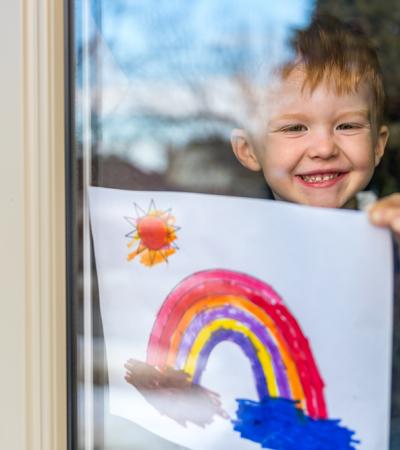Before COVID-19, the Princeton (N.J.) Public Library adult programming team periodically would discuss how we could offer a virtual component to accompany our in-person library programming. Could we livestream our larger events to an overflow space within the library? What would be the best way to record some of our programs and make them available to the public afterwards? These questions were discussed, with varying degrees of urgency, for months.
With the library shutdown in mid-March, those virtual programming discussions went from hypothetical to very real: which of our programs could be presented virtually? What technology would the library and partners need to deliver content effectively? How could we make community access as easy as possible?
Now, as we cautiously re-open the library, I'd like to share some of the quick decisions that we made in this period of unknowns. In many cases, our pivots were successful; in others, we never found the work-arounds that we needed. But as we move out of this first phase of the pandemic, we can certainly say we have learned a great deal about reaching patrons in new ways.
To cancel or switch to virtual?
Initially, we didn't know how long our library would be closed, so most programs were put on hold with the understanding that they would either be canceled or rescheduled for some future time when the library was open. It quickly became clear, though, that the shutdown was going to last for an indefinite period of time, and we’d have to decide which programming could and should be presented virtually, and how.
For many programs, presenting them virtually actually made good sense. With some preparatory work with presenters, staff could take in-person programming into the virtual realm with some tweaking. This works for programs like author talks, book discussions, job-seeking programs, crafting classes and conversation classes. Check out the PPL calendar for a complete listing of programs, including many great youth and kid-centered programs.
Some programs were indeed canceled (or at least indefinitely postponed) because the events — musical performances, for example — were not conducive to a virtual platform. (Now, though, after a few months of shutdown, we are also considering how we could present those tough-to-convert programs in a digital format.)
Platforms
Our second but concurrent consideration was which virtual platforms would work best for our needs. In the wide world of online video platforms, in which “Zoom” quickly became a verb, what would work best for our virtual programming needs and for our community? Here's what we found.
- Crowdcast: This platform became the best option for our larger programs. Crowdcast offers a variety of helpful functions including chat, Q&A and a call-to-action button. Multiple presenters can be on screen at once, and screen-sharing is simple. It also provides a lot of helpful analytics for each program. For PPL, this has worked very well for programs including author talks, panel talks and author talks and bigger lectures. You can see all the PPL Crowdcast programs here.
- Google Meet: Since the library uses G-suite, creating virtual spaces for programs through Google Meet is easy: just share the link with participants and one click gains them access to the program. This platform has worked well for book groups, smaller discussions and those programs where all participants should be able to see one another and interact quickly.
- Zoom: Although the library does not have its own Zoom account, several of our programming partners have institutional accounts and prefer to use it for our co-presented programs.
Below are a few of our planned in-person events and how PPL went about pivoting them (or not):
| Program | Pre-COVID Plan | Pivot | How It Went |
|---|---|---|---|
| Two poetry-related events featuring multiple readers | Host the program in the PPL Community Room, switching between multiple readers who were present in the room. End with open up for an open-mic portion of the program. | These events were postponed indefinitely for two reasons: they fell near the start of our shutdown and we were not prepared to pivot the programs, and because they involve switching between a lot of different presenters over the course of the program. | They may be rescheduled for when we are able to present some in-person programs, or may be reconsidered as a virtual program. |
| Author talks, specifically talks with Elaine Weiss on "Votes for Women" and Wenfei Tong on "Bird Love" | Host in the PPL Community Room with a capacity of around 100. We don't generally ask for registration for author talks, so people can show up as they please. | Crowdcast platform. People follow a link to enter the program (no pre-registration required) and can send in questions throughout. | Author talks have been going well in the virtual world. Thanks to post-program analytics, we know that audience numbers have been high for live programs, that many people are joining from outside our geographic area, and that many also watch the recorded programs on their own time. Some audience feedback has indicated that people have issues accessing virtual programs or experience issues related to their internet connections. |
| Reoccuring PPL book groups: Contemporary Fiction, Black Voices and Mystery groups | Normally held in-person in smaller rooms at the library. Registration is not required. | Registration required for attendees to get the Google Meet link. This platform works well for small group discussions where participants can see and hear each other throughout. | Attendees have experienced challenges connecting to the groups. Nonetheless, we have found many new and devoted attendees for each group. |
| Live outdoor music and dancing | Normally hosted on Hinds Plaza outside of the library's Community Room. | Canceled indefinitely. | Canceled indefinitely because New Jersey is not allowing in-person gatherings over a certain number of people. |
Marketing, communications and partnerships
It was a quick shift to be able to present all virtual programming through the library. This switch meant all programming staff had to quickly get up to speed on how to use the platforms well enough to make presenters and the audience comfortable using these new modes of presentation. But the transition also meant changes in marketing, relationships and more.
Since COVID, PPL is working on a much shorter marketing timeline. The library’s weekly email is now the main marketing tool we have to spread the word about our programs. This is a major contrast to our much longer cycle to produce print marketing when we were working in the building.
Communication within the team has also changed a lot. In the library building, we all shared an office space; now we meet virtually once a week and check in with each other at other times as needed. In order to not overlap on scheduling programs, we’ve continued to maintain several spreadsheets and calendars.
Partnering remains essential to how we run programs. Thanks to the flexibility of our frequent and wonderful programming partners, we can continue many popular and important programs virtually.
Unexpected benefits
When we first started offering virtual programs, we just didn’t know whether people would be interested in tuning in and whether a lack of technological expertise would be a barrier. From the programs we’ve run so far, it seems like people are definitely interested, and they’re adapting to the new technology along with library staff.
Our programming has reached a large number of people (in some cases a larger number than could have even fit in our largest in-person space) and has a wide geographic reach. The option for people to watch the recorded program on their own time has also bumped up the number of people we can reach.
Our switch to virtual programming also has longer-term benefits in that the programming team will be prepared to offer this virtual programming in perpetuity. When we are able to offer in-person programs again, we will also be in a better position to offer some virtual components.
Looking ahead
It’s impossible to know the timeline of being able to offer in-person programming again. We may remain all-virtual for some time and then slowly re-integrate in-person programs. What we do know is that we have a new skillset for presenting virtual programs, and that will help inform our work going forward.
Please share in the comments what your library has been presenting virtually and ideas about planning for programming going forward.



